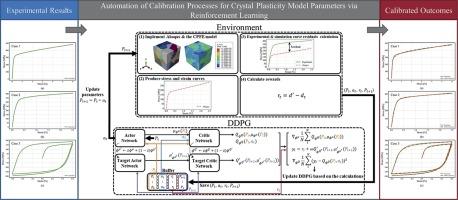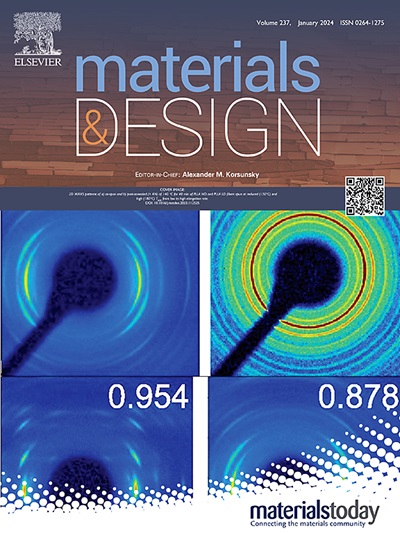通过强化学习实现晶体塑性模型参数校准过程的生产自动化
IF 7.6
2区 材料科学
Q1 MATERIALS SCIENCE, MULTIDISCIPLINARY
引用次数: 0
摘要
晶体塑性有限元(CPFE)将晶体塑性原理与有限元分析相结合,可以模拟多晶材料各向异性的晶粒级机械行为。由于 CPFE 的优点,它已被广泛用于分析制造、损坏和变形等过程,其中微观结构起着重要作用。然而,这种方法计算成本高昂,需要对其参数进行稳健校准,而校准的参数可能很多。在这项工作中,我们提出了一个框架,以解决多参数 CPFE 校准方面的困难。深度确定性策略梯度(DDPG)算法是一种深度强化学习(DRL)方法,可用于优化 CPFE 参数。此外,还开发了一个基于 Python 的环境,以实现校准过程的完全自动化。为了与传统的优化方法进行比较,还使用了粒子群优化(PSO)算法,结果表明 DDPG 框架能产生更精确的校准。通过校准两种不同 CPFE 模型的每个参数集,对 316L 不锈钢类型的单调加载进行校准,也证明了所提框架的通用性能。此外,通过校准 316H 不锈钢材料两周期循环行为的 CPFE 参数,也证明了该框架在更复杂条件下的有效性。这些校准参数的可靠性也在两个周期后的循环模拟中得到了验证。本文章由计算机程序翻译,如有差异,请以英文原文为准。

Productive automation of calibration processes for crystal plasticity model parameters via reinforcement learning
Crystal Plasticity Finite Element (CPFE), which merges crystal plasticity principles with finite element analysis, can simulate the anisotropic grain-level mechanical behaviour of polycrystalline materials. Due to the benefit of CPFE, it has been widely utilised to analyse processes such as manufacturing, damage, and deformation where the microstructure plays a prominent role. However, this method is computationally expensive and requires the robust calibration of its parameters, which can be many. In this work, we propose a framework to address difficulties in calibrating multi-parameter CPFE. The Deep Deterministic Policy Gradient (DDPG) algorithm, a Deep Reinforcement Learning (DRL) approach, is utilised to optimise the CPFE parameters. Additionally, a Python-based environment is developed to fully automate the calibration process. To allow comparison with the conventional optimisation method, the Particle Swarm Optimisation (PSO) algorithm is also used, which shows the DDPG framework yields more accurate calibration. The generalisation performance of the proposed framework is also demonstrated by calibrating each parameter set of two different CPFE models for monotonic loading of the stainless steel type, 316L. Moreover, the effectiveness of the framework in the more complex condition is also demonstrated by calibrating the CPFE parameters for a two-cycle cyclic behaviour of a 316H stainless steel material. The reliability of these calibrated parameters is also validated in the cyclic simulation after two cycles.
求助全文
通过发布文献求助,成功后即可免费获取论文全文。
去求助
来源期刊

Materials & Design
Engineering-Mechanical Engineering
CiteScore
14.30
自引率
7.10%
发文量
1028
审稿时长
85 days
期刊介绍:
Materials and Design is a multi-disciplinary journal that publishes original research reports, review articles, and express communications. The journal focuses on studying the structure and properties of inorganic and organic materials, advancements in synthesis, processing, characterization, and testing, the design of materials and engineering systems, and their applications in technology. It aims to bring together various aspects of materials science, engineering, physics, and chemistry.
The journal explores themes ranging from materials to design and aims to reveal the connections between natural and artificial materials, as well as experiment and modeling. Manuscripts submitted to Materials and Design should contain elements of discovery and surprise, as they often contribute new insights into the architecture and function of matter.
 求助内容:
求助内容: 应助结果提醒方式:
应助结果提醒方式:


